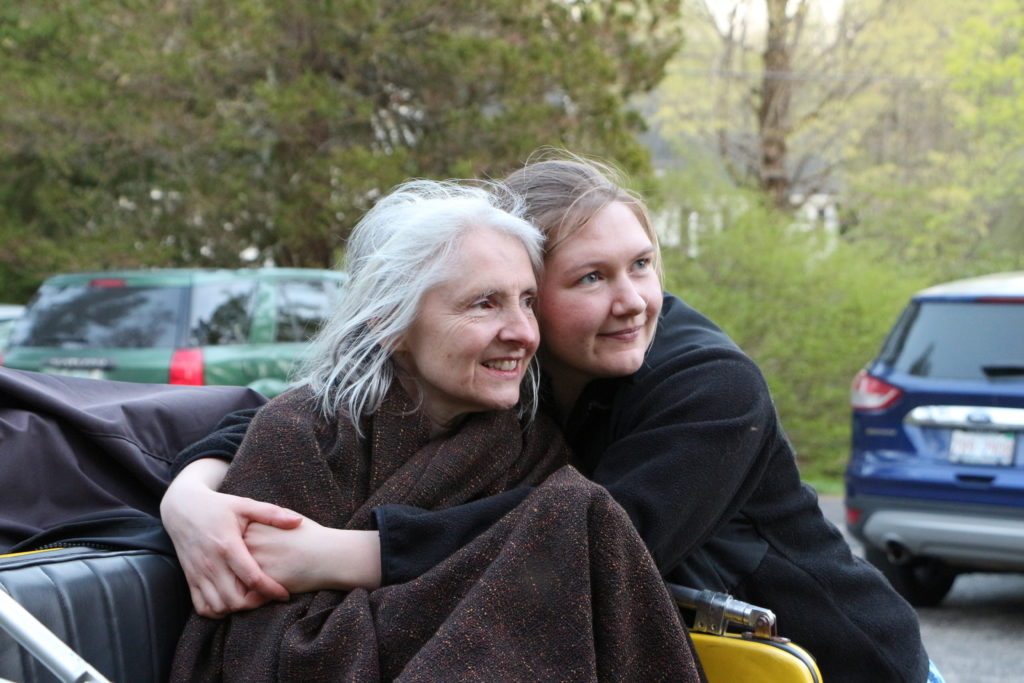Within that short time she listed so far that sliding off the bench was imminent. I rushed back, too late to prevent the slide but in time to prevent any harm. I sat her on the toilet (lid down) as squarely as possible but now faced a dilemma. Could I retrieve something from our room and get back to the bathroom before Cindy slid off the toilet?
I rushed out and back within ten seconds. That was plenty of time. I could have taken twenty seconds, maybe even thirty, but not a whole minute. I could tell Cindy would have fallen off her seat by then.
Thus I knew we had reached another milestone in her decline. Last fall she could no longer walk unsupported; this past winter she could no longer stand unsupported. Now, in the midst of spring, she could no longer sit unsupported. She did not improve throughout the day; if anything, she became more invalid by day’s end. I checked for exacerbating conditions: fever, runny nose, diarrhea. Cindy was fine in all ways, even her mood was cheerful, she just could not support herself sitting up.
Milestones are yet another parallel between our final journey and our hiking journeys. Milestones reflect how far you’ve gone, literally for hikers, otherwise figuratively. Yet for a long distance hiker with a destination a milestone also marks how little remains in the journey. How many milestones left can there be to our journey, now that she cannot sit unsupported?
There was a prelude to this milestone. At the start of the day before, as I was escorting Cindy out of the bathroom, she said: “I want to go home.” She did say that once before, two years ago, when she was distressed about something. This time was not in distress, just a matter of fact comment, similar to calling an enjoyable evening to a close.
Also on the day before she tapped me for the first time to request something. Twice. I actually thought that was encouraging at the time. For years she waited for me to anticipate her needs, now she was being proactive? That would seem like progress if not for this new milestone. Sometimes it’s difficult to fathom a deteriorating mind.
Charissa brought home a cake she baked for Mother’s Day. I scraped off some frosting from the cover and licked it. Then I scraped off more for Cindy to lick. Instead of licking she bit my finger hard. Really hard. I laughed in response and showed Charissa the teeth marks. I could see the humor in how foolish I was, as if this was my first day as a caregiver for Cindy.
My last post was about avoiding depression. I can find mirth when my heart is breaking, but I need to make an important correction to one of my “rules.” I senselessly cited optimism as a key to avoiding depression. Hmmm. That’s like saying being social is the key to being antisocial, getting an education is the key to being uneducated. Optimism springs forth from being well, not a simple decision to be optimistic in the face of tragedy. I should have listed dedication to brain health, not optimism, as one of my four rules for avoiding depression.
I hope people take that to heart. As I assisted Cindy throughout Mother’s Day I reflected on how a nursing home would handle her immobility. Even the best of them would have her sit in a chair that could properly confine and support her. Nothing wrong with that, except that my alternative, at least for some of the day, was to sit next to her as she leaned her head down on my shoulder. No nursing home, not even the best of them, would still walk her up and down the stairs, carefully moving one leg at a time, as well as walk her between rooms. No nursing home, not even the best, would consider taking a patient who could not sit up unsupported out for a pedicab ride. Nor would I be able to do any of these things for long if I had not been observing all the factors for good brain health … all of them.
Now I will need to be even more zealous about brain health, for Cindy’s sake and my own. If Cindy had been in a nursing home up until now, this probably would be the time to bring her home. I would not label any milestone at this late stage a bad thing; I appreciate the heads up, the reminder that time is short for savoring the last miles of the journey together. Yet the savoring throughout the final milestones of a journey, similar to avoiding depression, depends on similar rules: wellness, purpose, short term goals and the support of good people around you.


Saying “I want to go home” is such a powerful and beautiful statement applicable to any stage in life. Best to you.
Kirk thank you for today. Roland enjoyed the opportunity to ride with you and Cindy. I will look forward to reading you story.
Thank you, Eleanore. It was a pleasure giving Roland a ride. I will touch upon that in my next post.